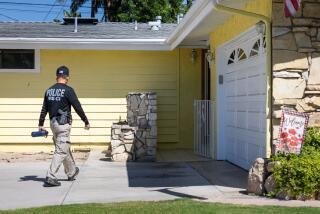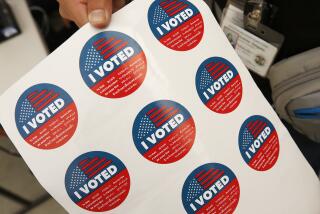Lawsuit Challenges Searches of Welfare Homes
SAN DIEGO — Advocates for the poor filed a lawsuit Monday challenging the legality of spot checks by San Diego County fraud investigators in homes of welfare applicants.
The class-action lawsuit was filed in U.S. District Court by the ACLU Foundation of San Diego and Imperial Counties on behalf of five plaintiffs and other applicants for benefits administered by the county’s Health and Human Services Agency. The ACLU was joined in the suit by the Western Center on Law & Poverty, in Los Angeles, and San Diego Advocates for Social Justice.
The suit alleges that the county’s anti-fraud program, called Project 100%, violates constitutional protections against unlawful searches by requiring would-be aid recipients to undergo searches of their homes as a condition of public assistance.
The so-called home calls, conducted by investigators assigned to a special public assistance fraud unit of the district attorney’s office, affect those applying for food stamps and CalWORKs, the state’s welfare-to-work program.
“The 4th Amendment does not permit the government to intrude into people’s homes and search belongings without some justification,” said Jordan Budd, managing attorney of the ACLU in San Diego.
Cathy Spearnak, a spokeswoman for the county’s Health and Human Services Agency, declined to comment on the lawsuit, saying officials have not yet seen it. She said about 30,600 families in San Diego County are enrolled in CalWORKs.
The checks of about 19,000 homes yearly were approved by county supervisors three years ago to prevent welfare fraud. The unit’s 31 investigators visit homes to verify the address, number of people living there and other data on the welfare applications.
The increased scrutiny has saved the county $11.6 million, said district attorney spokeswoman Denise Vedder.
“What we do is verify the information that the welfare applicants have provided. It’s like a background check,” Vedder said. “One of the ways we verify it is by going out to where the people say they live.”
“One of the problems in the past with welfare fraud is that information provided on paper was never verified,” Vedder said.
Frank Reid, a supervising district attorney’s investigator, declined to comment on the suit. But he said that investigators are instructed not to open drawers or doors during the visits. About 25% of the applicants are deemed by welfare officials to be ineligible for benefits after being visited by investigators, but none are prosecuted, Reid said.
But Budd said the problem is that Project 100% requires searches for all applicants, regardless of whether their applications are suspicious.
The lawsuit charges that applicants have been “humiliated and embarrassed” as investigators rifled drawers, picked through closets and medicine chests and went through discarded notes as part of the home searches. The would-be recipients have been grilled by investigators on sleeping arrangements, the number of toothbrushes, household expenses and the whereabouts of ex-spouses, according to the suit.
“It’s a terrifying experience,” Budd said.
More to Read
Sign up for Essential California
The most important California stories and recommendations in your inbox every morning.
You may occasionally receive promotional content from the Los Angeles Times.










